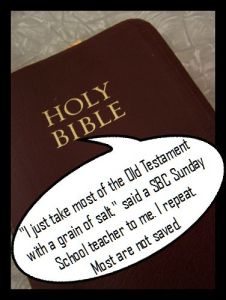What are the signs of a believer?
By Elizabeth Prata
If people would simply stop accepting at face value the proclamations of celebrity pastors and lady ‘Bible’ teachers, that they are Christians, the faith would be stronger.

When a megapastor, such as the types like Mr Furtick, Mr Driscoll, or Mr Stanley, or a lady ‘Bible’ teacher like Beth Moore or Jennie Allen or Joyce Meyer teach something that isn’t in the Bible, or otherwise make an outrageous statement, the thinking goes something like this:
“What?! How could Pastor So-and-So say that? He says s/he’s a Christian, so how can s/he not know that isn’t the truth?! Since s/he says they are a Christian, we have to find out what s/he really meant. It must be a mistake, or s/he said it because s/he must be temporarily under the influence of NyQuil. Of course s/he is a Christian (because Pastor So-and-So says he is) and Christians would know better than to teach that.”
Complex rhetorical pretzel-logic ensues.

You know, most people who say they’re saved, are not saved. Am I pessimistic? Am I “judging the heart”? Am I “judging their motives”? No. Jesus said that many go on the broad way to destruction and few find the way to salvation. (Matthew 7:14). Jesus followed that statement immediately in the next verse, saying
Watch out for false prophets. They come to you in sheep’s clothing, but inwardly they are ferocious wolves. (Matthew 7:15). Further on we read the devastating verses in Matthew 7:21-23 where many are unveiled to not have been a Christian all along. Jesus says ‘Depart from me, yu worker of iniquity, I never knew you.’
In the New Testament ‘false prophets’ are pastors, a word we’re more familiar with today. Or they are teachers.
If someone in real life says to me that they are saved, I don’t dismiss their statement, of course. But I do not accept it at face value, either. I listen to testimony, I watch for fruit, I reserve comment or opinion on their self-proclamation until I see one way or another which way their wind blows. That takes time.
But if someone is a pastor or teacher at the highest levels with a following or influence, and thus a body of work to examine and compare to the Bible (Acts 17:11), and they say something incontrovertibly against a foundational doctrine, (like when Billy Graham says we can go to heaven without knowing Jesus; or the wild abuses against the Spirit of Benny Hinn or Joyce Meyer, or the greed with which a Joel Osteen bows to Mammon), then it’s understood in my mind that someone with the Holy Spirit in them would never teach that or behave that way. Ever.

There are some simple items to help people begin to understand whether to call someone a brother. Here are a few-
1. True believers will understand, confess, and defend the true Gospel of Jesus Christ. (See Corinthians 15:1-5.)
2. Actual Christians will discerningly spot counterfeit gospels and conclusively reject all of them. (See Galatians 1:6-9).
3. Believers, while not morally perfect until glorification, will care about holiness and will strive to live according to God’s commands. If pointed out to be teaching falsity or to be in sin, they will hasten to correct (See I Corinthians 6:9-11).
Remember, the Holy Spirit indwells a true believer. He will not allow decades of falsity to spew from the pastor’s or teacher’s mouth. He will not allow decades of behavioral abuse to continue. If an actual believer teaching something falls into sin, after a short while it will be resolved through repentance, or even in the case of the Corinthians they were disciplined with sickness or even death for abusing the Lord’s Table, or the Thyatirans who followed metaphorical Jezebel, Jesus threatened to kill them. The Spirit’s ministry is to point to Jesus, not allow falsity from one of His sheep to confuse the unwary and pollute the faith. We must see Jesus with clear eyes. Many, believe it or not, do not profess the true Jesus, but sadly, many do not know that the foundation of their faith is sand and not the Rock. (see Matthew 7:21-23).
In his Handout Church History Lecture series, John Gerstner said in 1990,
How goes the Gospel in the world at the end of the twentieth century? There is no way of getting full or accurate statistics (though there are many useful attempts). One can only make educated guesses. Mine is that the vast majority—maybe 90 percent—of professing Christendom does not profess Christianity. Or rather, it does not understand the Christianity it professes.
Most of the people who profess Christ do not believe the essential doctrines that set one apart as a regenerated, saved Christian. I have seen this up close. A Southern Baptist Convention Sunday School Teacher/Director laughingly said to me once, “Oh, I just take most of the Old Testament with a grain of salt.”
Here is Got Questions with 12 verses answering What are some of the signs of genuine saving faith?
Here is John MacArthur with an essay on “What kind of things do and do not prove the genuineness of saving faith?” Do not be caught by the conditions observed in a person that do not prove OR disprove genuine saving faith, such as: Visible Morality, Intellectual Knowledge, Religious Involvement, Active Ministry, Conviction of Sin, The Feeling of Assurance, A Time of Decision. Then MacArthur continues in showing Nine conditions that DO prove genuine saving faith. Here is the link.
Ever since the beginning of my walk with the Lord, I have been concerned with the notion of false professions, false Christians, and polluted faith. I work at not contributing to the problem by examining myself, confessing sin when necessary, and keeping my eyes on “This Same Jesus” who departed in Acts 1:11 and will return the same way.
I dread the day when Matthew 7:21-23 comes true, when many (hopefully not me!) will be unmasked as false believers and sent to hell. However, that will be one way that Jesus’ glory will be shown to be even more glorious than we ever could imagine. These things must be pondered.







